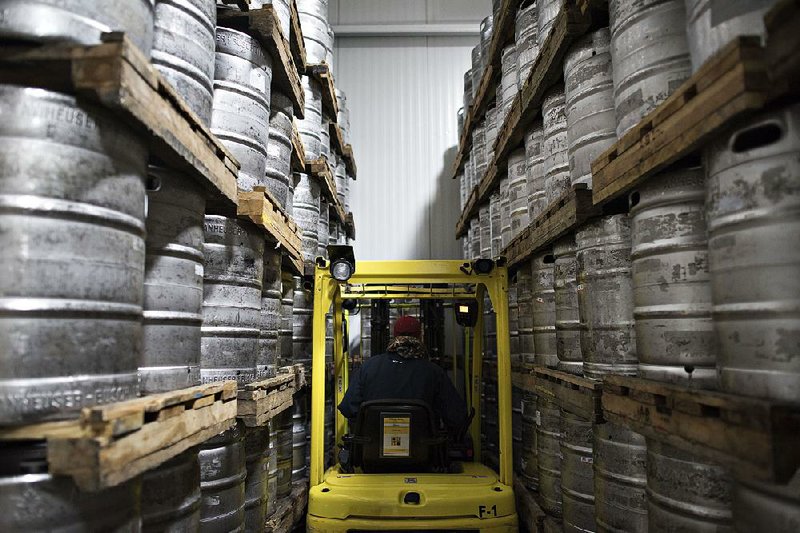ST. LOUIS -- The world's largest brewer by volume, Anheuser-Busch InBev, confirmed Wednesday what has been widely speculated for more than a year: It wants to buy rival SABMiller, the second-largest global brewer.
No specific offer has been made, but A-B InBev, or ABI, said in a statement that it has made "an approach to SABMiller's board of directors regarding a combination of the two companies."
Belgium-based ABI said its intention is to work with SABMiller's board toward a recommended transaction, and "there can be no certainty that this approach will result in an offer or agreement, or as to the terms of such agreement."
Separately, SABMiller said it "would review and respond as appropriate to any proposal which might be made."
An A-B InBev spokesman declined to comment Wednesday beyond the news release, which says: "A further statement will be made as appropriate."
It won't be long before next steps are revealed. Takeover rules in the United Kingdom, where SABMiller is based, require A-B InBev to either make a bid or abandon its plan by Oct. 14.
Shares in SAB, whose brands include Aguila and Miller Lite, shot up 20 percent. A-B InBev, which makes Bud Light, Budweiser and Stella Artois, rose 6 percent.
In the largest beer merger to date, Belgium-based InBev acquired St. Louis-based Anheuser-Busch for $52 billion in 2008, and made St. Louis its U.S. headquarters.
"This is probably going to be the biggest beer deal that could ever be done," Benj Steinman, editor of industry publication Beer Marketer's Insights, said of a combination of ABI and SABMiller.
A combination is a good strategic fit for ABI to extend its reach geographically in fast-growing markets, particularly in Africa, where SABMiller has a strong presence, and in Latin America, where A-B InBev is dominant, Steinman said. "It would make the U.S. less central to ABI's global business. I don't know how that would manifest itself in St. Louis."
The effect on St. Louis' operations is unknown. The St. Louis brewery is A-B InBev's largest U.S. brewery, and its U.S. headquarters including legal staff, information technology and other operations remain based there. The brewer employs several thousand people locally, but it has pared its local workforce since 2008, including the recent relocation of its sales and marketing operations to an office in New York.
Speculation about a combination of InBev and London-based SABMiller has intensified in recent years.
The prospect of rising interest rates may have played a role in Wednesday's announcement, but stock valuations likely drove the decision, said Morningstar analyst Philip Gorham.
Based on current prices, a merger of the two companies would have a market value of about $275 billion, Reuters reported.
"The stock price today won't be the stock price tomorrow," Gorham said. "It's obviously something A-B InBev has kept an eye on for a long time. They're just being patient and opportunistic about it. They've waited for a stock market valuation of SAB that allows them to pay a premium to market price but still creates value for themselves."
The creation of a dominant beer giant controlling a third of the world's beer will face antitrust scrutiny. "The U.S., obviously, and China are the problem spots from an antitrust perspective," Gorham said.
To satisfy antitrust concerns in the U.S., SABMiller would likely have to divest its stake in MillerCoors, the Chicago-based joint venture created in 2007 between SABMiller and Molson Coors Brewing Co.
"There's no doubt that ABI would have to sell the 58 percent of MillerCoors that SABMiller owns," Steinman said.
Denver-based Molson Coors would be the most likely acquirer of SAB's stake in the MillerCoors joint venture and the state-run China Resources Enterprise, or CRE, is a likely buyer in China, analysts said. After ABI's announcement, Molson Coors' shares jumped 13 percent Wednesday.
The U.S. Department of Justice "would almost certainly insist on the disposal of SAB's stake in MillerCoors in the USA," Trevor Stirling, an analyst at Sanford C. Bernstein, wrote in a research note this morning, adding A-B InBev may have to dispose of its 49 percent stake in CR Snow in China. "But it is also likely that Molson Coors and CRE would be willing purchasers respectively."
With having one leading contender in the U.S. to take on SAB's stake in MillerCoors, it adds risk for A-B InBev. "The problem there is they're the only buyers in town," Gorham said of Molson Coors. "When that happens, the purchase price tends to favor the buyer more than the seller."
Business on 09/17/2015

